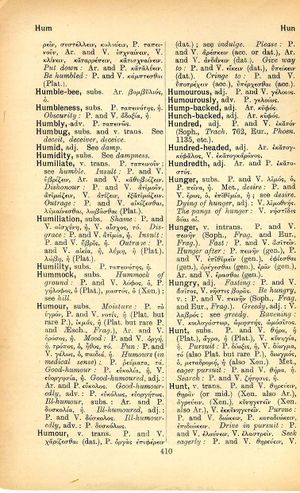humiliation: Difference between revisions
From LSJ
εἰ γάρ κεν καὶ σμικρὸν ἐπὶ σμικρῷ καταθεῖο καὶ θαμὰ τοῦτ᾽ ἔρδοις, τάχα κεν μέγα καὶ τὸ γένοιτο → for if you add only a little to a little and do this often, soon that little will become great (Hesiod W&D, 361-362)
m (Woodhouse1 replacement) |
mNo edit summary |
||
| Line 9: | Line 9: | ||
[[insult]]: [[prose|P.]] and [[verse|V.]] [[ὕβρις]], ἡ. | [[insult]]: [[prose|P.]] and [[verse|V.]] [[ὕβρις]], ἡ. | ||
[[outrage]]: [[prose|P.]] and [[verse|V.]] [[ | [[outrage]]: [[prose|P.]] and [[verse|V.]] [[αἰκία]], ἡ, [[λύμη]], ἡ ([[Plato]]). [[λώβη]], ἡ ([[Plato]]). | ||
}} | }} | ||

